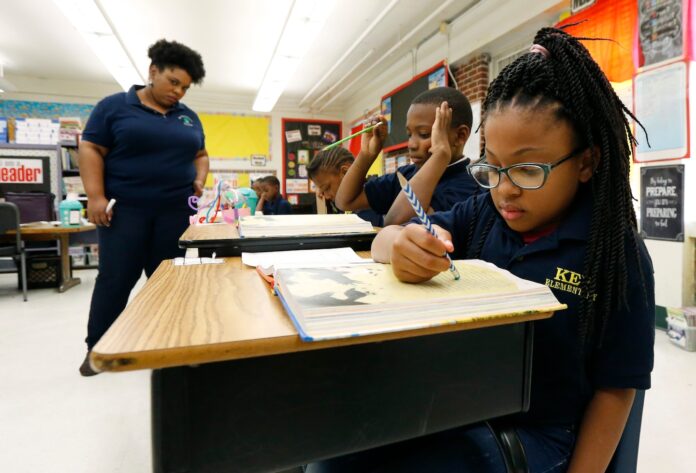Local officials all over the country are attempting to unspool the story of Mississippi’s journey from worst in the nation in test scores to the middle of the pack. Schools everywhere are struggling to catch up students after learning loss from the pandemic. Most states have been unable to match pre-2020 levels of achievement. Mississippi, however, set a personal record in reading this year, and its gains on the National Assessment of Educational Progress exceed every one of its peers’.
Much has been made of Mississippi’s stringent rule preventing third-grade students from moving to fourth if they aren’t reading proficiently. The state is far from alone in enforcing such a standard; more than a dozen others require retention, and more still allow for it at schools’ and parents’ discretion. But the policy is controversial. There is social and emotional impact when children’s friends leave them behind. The science is clear that, for retention policies applied in later grades, those costs outweigh the benefits — prompting increased chronic absenteeism and dropout rates that negate gains from additional instructional time. Yet for younger students, the picture is blurrier.
Older studies, covering mostly the 1990s, caution against retaining students at any age. Yet recent analyses are more sanguine. Evidence suggests that students in middle or high school who are held back tend to be less engaged, but it also finds that retaining elementary school students can lead to more positive outcomes. A review this year, focused on early literacy policies during the 2010s, discovered that states whose strategies included retention boasted greater progress in test scores. And an analysis homing in on the inaugural group of Mississippians subject to the state’s rule concluded that repeating third grade resulted in significantly higher reading scores in sixth grade — with Black and Hispanic students showing particular improvement.
All this news is encouraging — except for one big problem. It is impossible to disentangle retention itself from all that comes with it. There’s lots else that held-back students get in states that have revamped their approach to literacy: after-class tutoring, for example, or specialized instruction during the school day, or other types of help that another year of school, a perfect mirror of the year before it, wouldn’t provide on its own.
There’s something more. Retention isn’t popular with parents. It’s expensive, too. As a result, schools generally don’t want students to repeat a year. Sometimes, the response is to grant exemptions, some (whether a student speaks English as a second language, has a disability or is a second-time repeater) more thoughtful than others (whether a family makes a fuss). Better, though, is for schools to react by preventing students from missing cutoffs in the first place: committing to early detection of students’ struggles as well as early attempts to address them. Mississippi, for instance, has brought roughly 75 percent of students to pass the initial administration of its assessment — and closer to 85 percent to pass the retest.
The upshot is that retention policies might raise districts’ average scores because of gains by not only students who are retained but also students who aren’t. Yet it’s vital to recognize that none of this improvement, by retained students or students allowed to continue to the next grade, occurs thanks to retention alone.
In Mississippi, literacy coaches have been painstakingly selected, trained and monitored by the state and dispatched to perform one job: supporting teachers as they learn, and learn to teach, the science of reading. Teacher preparation programs have evolved to encompass these methods. The curricular materials recommended by the state match up, too. When kids fall behind, they’re identified and they’re given aid.
Retention done right might be part of the comprehensive strategy needed to catch up kids after school shutdowns from covid-19. More time will yield more answers, as students subject to this decade’s policies move into high school and beyond. Yet retention done absent such a strategy is retention done wrong — and it might hurt more than it helps. That’s why obsessing over retention as some sort of magic solution to learning loss is the wrong approach; silver bullets are no more possible than miracles. Treating retention like one could usher in its drawbacks without ensuring any of its advantages.



